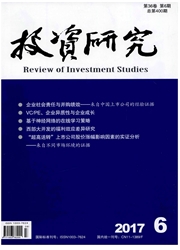

 中文摘要:
中文摘要:
投资者情绪对股票收益影响近几年得到了学术界和业界的广泛关注。本文针对我国A股上市公司股票,运用多因子模型,在控制Fama-French三因子和Carhart的动量因子之后,对投资者情绪是否能够显著地解释股票横截面收益进行了探讨,同时通过引入条件α,分析了投资者情绪对股票横截面收益的定价作用。结论表明,在与投资者情绪呈"负"敏感性的公司中,表现为高波动率、小规模、低盈利、极端增长性和低股息率的股票收益显著受投资者情绪影响,并且股票横截面收益在不同程度信息透明度下能够获得相应的风险补偿;但这些结论在与投资者情绪呈"正"敏感性的公司中却并不明显。
 英文摘要:
英文摘要:
it has been widespread concerned in academia and industry for the impact of investor's sentiment on stock returns in recent years. For the A-shares in Chinese stock market, we employ multi-factors model to investigate whether investor's sentiment can significantly explain the cross-section of stock returns under controlling Fama-French three factors and Carhart's momentum factor, and analyze the pricing function of investor's sentiment on cross-section of stock returns by incorporating condition α. The conclusions indicate that the returns of these stocks with high volatility, small size, low profitability, extreme growth and low dividend yield would be significantly affected by investor's sentiment among the stocks whose returns present negative sensitive to investor's sentiment; and the cross-section of stock returns obtain corresponding risk compensation under different levels of information opaque. But these results are not clear for the stocks whose returns present positive sensitive to investor's sentiment.
 同期刊论文项目
同期刊论文项目
 同项目期刊论文
同项目期刊论文
 期刊信息
期刊信息
